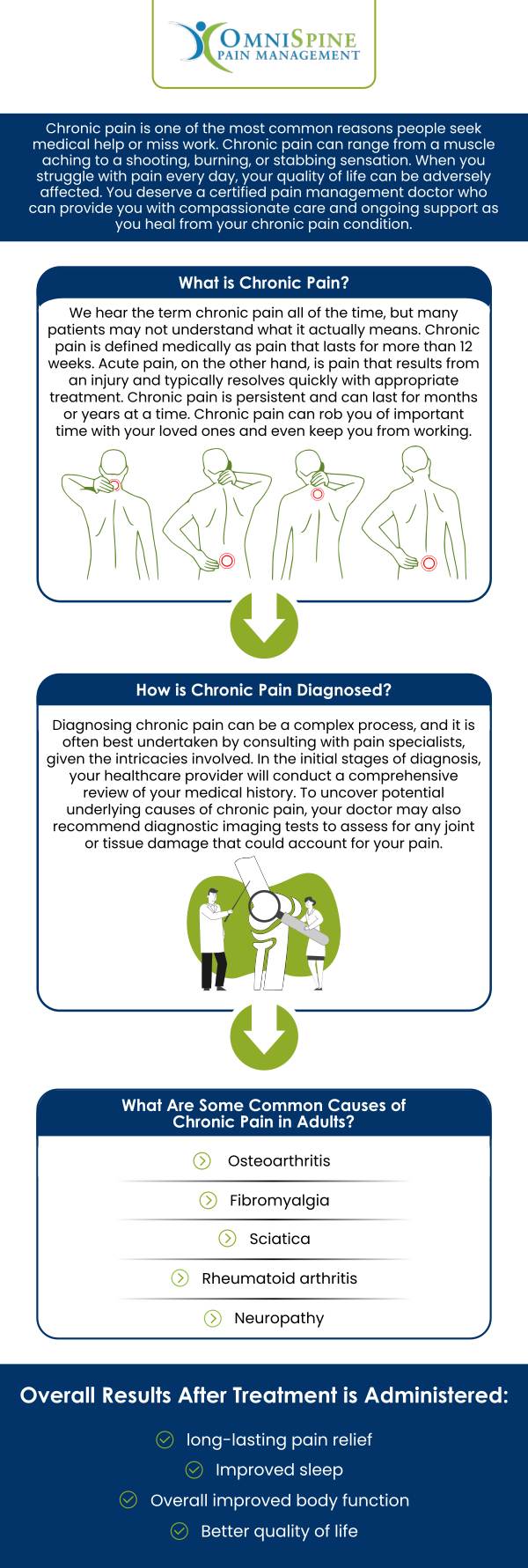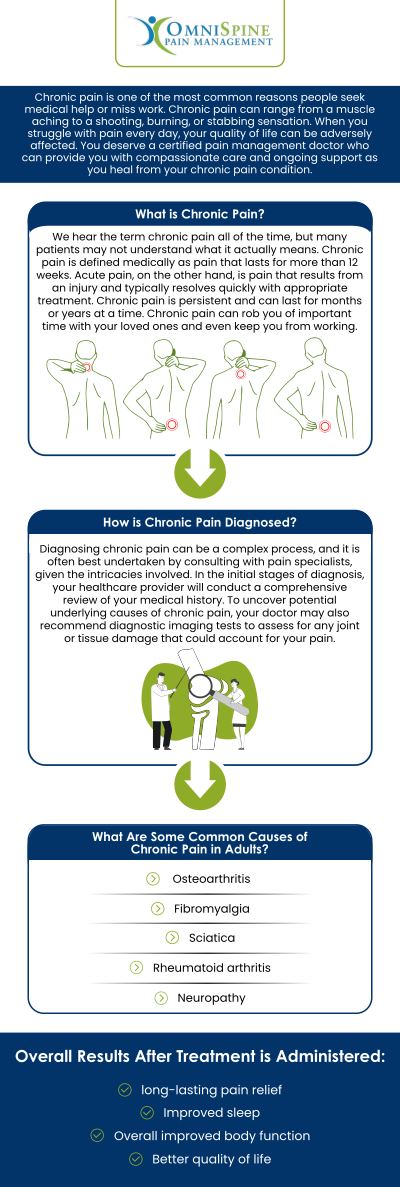What to Do When Chronic Pain Becomes Too Much?
It’s important to seek professional help for chronic pain when it lingers beyond the expected healing time for the underlying condition or starts to severely impact daily activities and quality of life. If pain persists for more than three to six months or worsens despite home care and over-the-counter remedies, consulting a healthcare provider becomes essential. Chronic pain treatment is available at OmniSpine Pain Management. Dr. Andrew Morchower offers treatments for chronic pain at OmniSpine Pain Management. For more information, Contact us today or book an appointment online. Our clinics are located in Frisco TX, Sunnyvale TX, and Mesquite TX.


Table of Contents:
What are the signs that chronic pain is becoming unmanageable?
When should I seek professional help for chronic pain?
What treatment options exist for the management of severe chronic pain?
What part does mental health play in chronic pain management?
Chronic pain can become unmanageable when it begins to interfere significantly with daily activities, sleep, and overall quality of life. If pain is consistently preventing a person from working, performing routine tasks, or engaging in social activities, it may be a sign that the pain is worsening or that current pain management strategies are no longer effective.
Another indicator is the increasing reliance on pain medications without sufficient relief, or the need for higher doses to achieve the same level of comfort. Additionally, emotional distress, such as feelings of hopelessness, anxiety, or depression, often accompanies unmanageable pain, further complicating the individual’s ability to cope with their condition. The frustration and exhaustion from constantly battling pain can lead to various problems where both mental and physical health deteriorate. This situation often necessitates a comprehensive assessment of the pain management plan, possibly involving a multidisciplinary approach that includes medical, psychological, and physical therapy interventions.
Seeking professional help for chronic pain should be considered when the pain persists beyond what is typical for the underlying condition, or when it begins to significantly impair daily functioning and quality of life. Chronic pain that lasts for more than three to six months, or pain that is becoming progressively worse despite home management and over-the-counter treatments, makes it necessary to consult a healthcare provider.
Additionally, in circumstances where pain is accompanied by the presence of additional symptoms such as numbness, weakness, or unexplained weight loss, it becomes necessary to seek medical evaluation promptly. Early intervention is key to preventing chronic pain from becoming a long-term, debilitating condition. By seeking professional help early, patients can explore a variety of treatment options that may be more effective in managing pain before it becomes severe.
There are several treatment options available for severe chronic pain, ranging from conventional medical approaches to more advanced interventional techniques. OmniSpine Pain Management has access to a wide range of cutting-edge practices to help patients achieve swift and lasting pain relief. Front-line medications such as nonsteroidal anti-inflammatory drugs (NSAIDs), muscle relaxants, and opioids are commonly prescribed to manage pain, although their long-term use must be carefully monitored due to potential side effects.
For more targeted relief, corticosteroid injections or nerve blocks may be used to reduce inflammation and interrupt pain signals. Among patients who are experiencing severe chronic pain that has not responded to standard treatments, more advanced interventions may be considered. These can include spinal cord stimulation, where electrical impulses are used to help block pain signals before they can reach the brain, or the use of implantable pain pumps that deliver medication directly to the spinal cord. By combining multiple modalities, patients have a better chance of achieving meaningful pain relief and improving their overall quality of life.
Mental health and chronic pain can often be closely interconnected. Chronic pain often leads to emotional distress, including anxiety, depression, and feelings of helplessness, which can, in turn, exacerbate the perception of pain. This creates a vicious cycle where pain worsens emotional well-being, and poor mental health increases the intensity and impact of pain. Incorporating mental health support into chronic pain management may involve counseling and forms of psychotherapy. These therapies can help patients develop coping strategies, reframe negative thought patterns, and reduce the emotional burden of living with chronic pain.
Various mental wellness practices can help patients manage the psychological impact of pain, improve their resilience, and enhance their overall treatment outcomes. Chronic pain treatment is available at OmniSpine Pain Management. For more information, contact us today or book an appointment online. Our clinics are located in Frisco TX, Sunnyvale TX, and Mesquite TX. We serve patients from Dallas TX, Frisco TX, Mesquite TX, Sunnyvale TX, Plano TX, Garland TX, Forney TX, Cedar Hill TX, Denton TX, Balch Springs TX, and surrounding areas.
Check Out Our 5 Star Reviews






